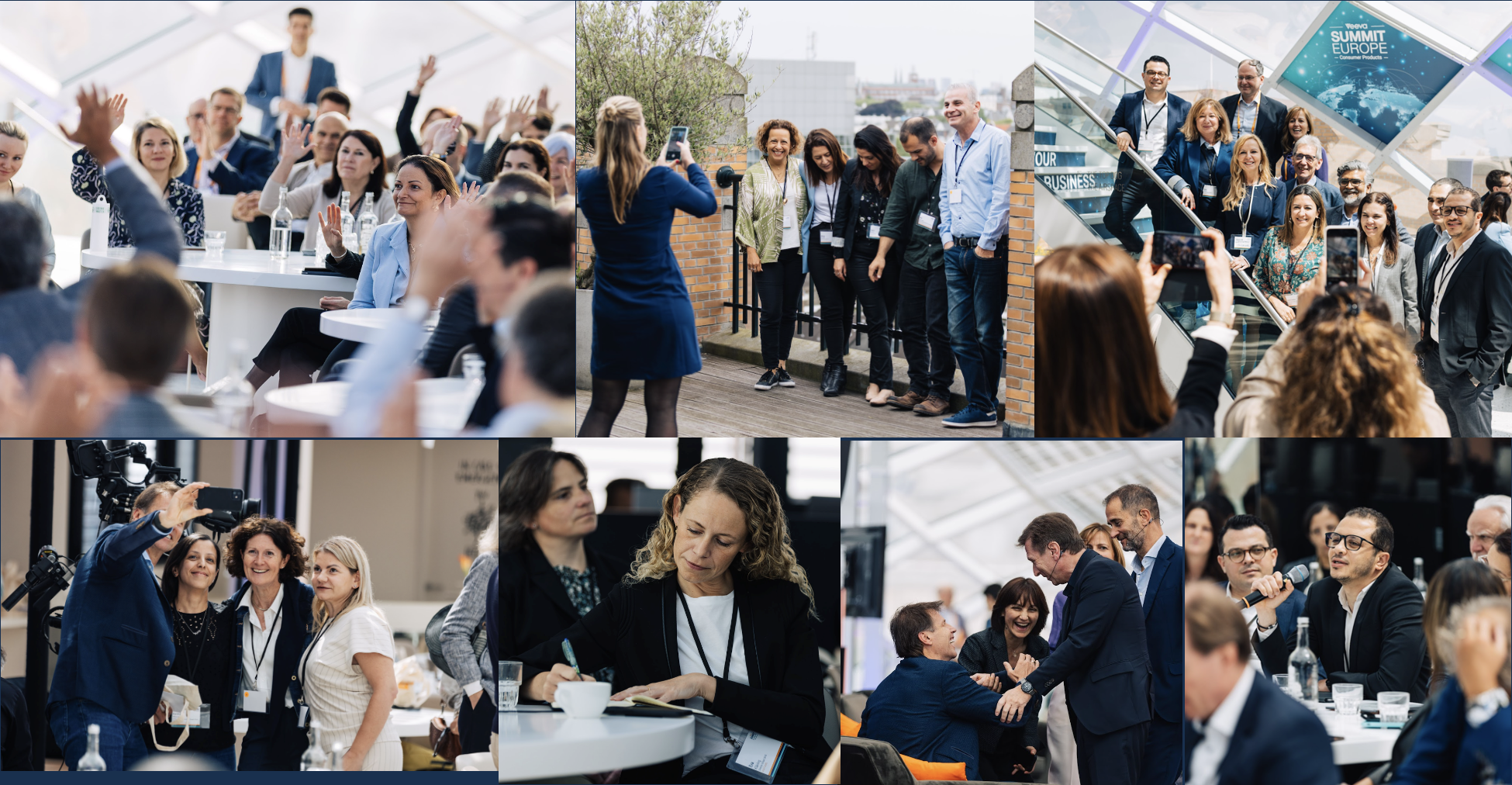This month, over 100 leaders from 40 global consumer product enterprises, including Unilever, Danone, Estée Lauder, and more, gathered in Amsterdam for this year’s Veeva Consumer Products EU Summit.
The event, themed "The Digital Advantage for Superior Products," served as the premier forum for industry executives looking to explore the transformative power of digital tools and AI as they apply to critical business functions such as quality management, health & safety, regulatory compliance, and product marketing claims management.
As the consumer products industry faces increasing pressure from regulatory changes, sustainability demands, and the rapid pace of technological advancements, the Veeva Consumer Products Summit offered invaluable insights and strategies to navigate these challenges.
While we wait for the on-demand session recordings to become available, here’s a recap of the key sessions and takeaways that participants are bringing back to their organizations to drive innovation and excellence.
Navigating Digital Transformation in the Era of AI
The Summit kicked off with a compelling keynote on "Navigating Digital Transformation in the Era of AI." The session emphasized starting small and strategic with AI, focusing on specific areas where AI can significantly enhance efficiency and effectiveness.
 Attendees learned the importance of cultivating a data-first mindset to deepen customer engagement, exemplified by L'Oreal's New Beauty initiative, which uses customer data to recommend personalized skincare products.
Attendees learned the importance of cultivating a data-first mindset to deepen customer engagement, exemplified by L'Oreal's New Beauty initiative, which uses customer data to recommend personalized skincare products.
Panelists included Alberto Prado, Global Head of R&D Digital & Partnerships at Unilever, Matthieu Cassier, Chief Digital & Transformation Officer, Research & Innovation at L’Oreal, and Stefan Vos, Industry X Lead for Consumer Goods Europe at Accenture.
The keynote also highlighted the necessity of integrated platforms for AI, moving away from bespoke IT solutions to robust data infrastructures that can handle extensive data requirements. This shift enables meaningful and scalable AI applications across organizations, setting the stage for a future where AI acts as a digital assistant to improve and accelerate tasks.
"Transformation is not a discrete event; it’s about embedding transformation and agility in your DNA,” shared Prado. “We need to balance the potential of AI without over-regulating it, ensuring that we don't miss any opportunities while maintaining compliance."
Transforming Quality Operations for Superior Consumer Experiences
In the session on "Transforming Quality Operations for Superior Consumer Experiences," speakers discussed the critical role of digital tools and AI in enhancing quality management processes. By predicting potential issues and providing real-time insights, these technologies lead to better consumer experiences. The session underscored the importance of engaging teams early in digital initiatives to address resistance to change and maximize the benefits of digitalization.
Building a quality-driven culture was another focal point, with strategies to actively engage employees, secure leadership commitment, and align organizational purpose with quality strategy. Prioritizing consumer insights in quality management efforts was highlighted as a driver for product improvements and business growth.
Panelists included Berenice Vettore, Global Chief Quality Officer at the Estée Lauder Companies, Natasha Zuyev, Chief Quality Officer at Kenvue, Marie Tanner, Senior Vice President and Global Head of Quality at Reckitt, and Aldo Caceres, Chief Quality Officer at Beiersdorf.
“I really saw how culture impacts quality overall too,” shared Tanner. “You could have the best systems, the best procedures, all of that. If you don't have the right culture, it's going to derail what you're trying to do.”
Driving Growth and Innovation Through Regulatory Excellence
The session on "Driving Growth and Innovation Through Regulatory Excellence" addressed the need for regulatory harmonization and adaptability in the face of significant changes in the cosmetics and food industries. Speakers emphasized the importance of cross-border collaboration and compliance with evolving regulations to maintain product success and meet consumer expectations.
Sustainability and transparency in product manufacturing and regulatory practices were also key themes. The European Green Deal and other initiatives are driving mandatory transparency, encouraging industries to prioritize sustainable R&D and responsible innovation. Regulatory professionals were urged to develop strategic capabilities, business acumen, and effective communication skills to navigate complex regulatory landscapes.
Panelists included Arun Mishra, Global Head Regulatory Affairs, Beauty & Wellbeing at Unilever, Horst Wenck, Corporate Vice President, R&D Global Product Stewardship at Beiersdorf, and John Athanatos, Global Head of Regulatory and Scientific Affairs, at Nestlé Nutrition.
Transforming Quality & Food Safety Towards a Predictive State of Management
The session on "Transforming Quality & Food Safety Towards a Predictive State of Management" explored the potential of predictive analytics and AI to enhance food safety and quality management. These technologies enable proactive identification of potential food safety incidents, reducing the likelihood of recalls and mitigating risks.
Effective food safety management was shown to hinge on robust collaboration and data sharing across the industry. Successful examples of cross-industry collaborations and data-driven decision-making processes were shared, highlighting the importance of systematic data sharing practices.
Panelists included Olivier Mignot, VP and Head of Global Quality Management at Nestlé, Susanne Garcia-Schauermann SVP, Global Quality Assurance, Food Safety, & Regulatory Affairs at Mondelēz International, and Silvia Pereira, VP and Corporate Quality & Food Safety at Mars.
“I think collaboration between the Food Safety & Quality function and IT and data functions within the organization is critically important," Mignot shared. "And I think more and more what we see is to really embed the IT function and data analyst and data people into the function. I see them as partners, but to be a partner, you need to be fully embedded into the function, you need to really understand what problem are you solving for.”
Cultivating a Culture of Quality Through Continuous Improvement
 In the session on "Cultivating a Culture of Quality Through Continuous Improvement," leaders discussed the crucial role of leadership in driving a culture of quality. Empowering employees and aligning values with priorities were seen as essential for fostering engagement and promoting a continuous improvement mindset.
In the session on "Cultivating a Culture of Quality Through Continuous Improvement," leaders discussed the crucial role of leadership in driving a culture of quality. Empowering employees and aligning values with priorities were seen as essential for fostering engagement and promoting a continuous improvement mindset.
The integration of digital technology and storytelling was highlighted as vital for building a strong quality culture. Digital tools, such as consumer feedback systems and data-driven decision-making, help measure and improve quality culture, while storytelling engages stakeholders and drives positive change.
Panelists included Zoltan Syposs SVP, Chief of Quality, Safety & Environmental at Coca-Cola, Jos Wellekens, Senior Vice President, Quality & Food Safety at Danone, Roberto Buttini Vice President Global Quality & Food Safety and R&D Strategy at Barilla, and Monique Pellegrino Chief Food Safety & Quality Officer at Ferrero.
The Quality Continuum – Strategies for Excellence Across the CPG Value Chain
The final session, "The Quality Continuum – Strategies for Excellence Across the CPG Value Chain," emphasized the integration of quality management and R&D collaboration. Establishing strong partnerships between these functions is crucial for driving innovation and maintaining high standards in the CPG industry.
Developing close relationships with customers and suppliers was also highlighted as essential for managing complex supply chains effectively. Embracing digital tools and technologies, such as digital traceability and remote statistical process control, can significantly improve quality management systems, leading to more efficient compliance and enhanced product quality.
Panelists included Michalis Poulikidi, Global Head of Quality - Home Care at Unilever, Mikael Bundgaard-Nielsen, VP of Quality & EHS at Novonesis, Ana Rita Rezende Debiazzi, Group Head of Quality at dsm-firmenich, and Steven Oliver, R&D Senior Director - Food Safety & Quality Assurance at Pepsico.
SHARE






